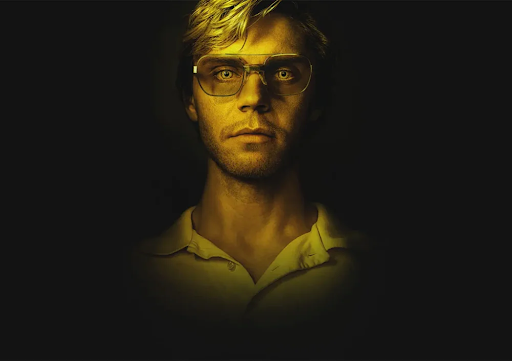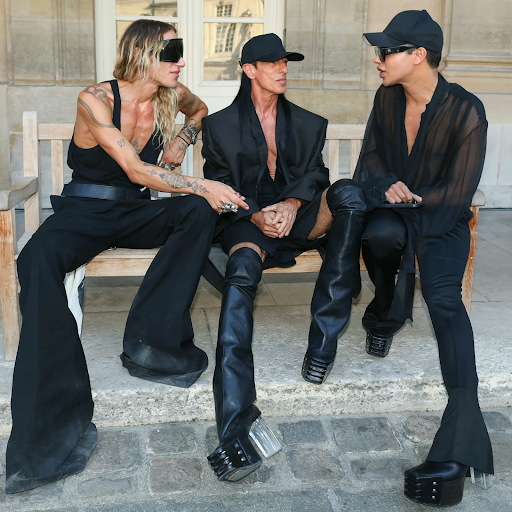The Damage Done by Serial Killers’ Media Presence

Photo Source: Netflix.com
January 24, 2023
It is no secret that people look at all the strange and unusual in our world as a source of entertainment. If someone is different from society’s norms, they are something to laugh at. People take an extreme amount of interest in things and people that are different from them.
One subject in particular is serial killers. A serial killer is a person who commits a series of murders, often with no apparent motive and typically following a characteristic, predictable behavior pattern (Oxford Languages).
People often find excitement in binge-watching the latest piece of Jeffery Dahmer media or a new documentaryon John Wayne Gacy and his killings. People are intrigued by the abnormal characteristics of sick and twisted human beings, but there proves to be damage in this unhealthy obsession. Over the past few years, there has been an increase in serial killer content and this has caused many societal and personal issues.
In most of these series, we are taken through the mindset and methods of these killers and oftentimes they are made out as a “product of their environment” or “a victim of their situation”. The problem with this is that it creates more sympathy for someone who took and/or ruined countless lives.
The effect on real people
When taking real lives, real people are left behind mourning their loved ones. Losing someone you love is hard, but losing them to a horrific murder that is then plastered all over every streaming platform make it alot more difficult.
In late September, the Netflix series Monster: The Jeffrey Dahmer Story was released. The show has gained over one billion hours of watch time and has become Netflix’s #2 most watched English television show of all time (Collider). With something that popular it is going to catch the attention of absolutely anyone scrolling through Netflix, Instagram, Facebook, etc.
The problem with this insane amount of attention is it will garner the eyes of those who do not want to see it. The family members of Dahmer’s victims have spoken out on the distastefulness of the series, one being the daughter of Dahmer’s nineteen year old victim, Errol Lindsey. Tatiana Banks was born six months after her father’s death which is something that has stuck with her throughout her life.
Bank’s decided to watch one episode of the show which included a portrayal of her aunt’s appearance in court. It was heartbreaking for her to watch, and she saw the show as disturbing and couldn’t force herself to watch any more. In an interview with Insider, she said“Honestly ever since that show’s been on, I haven’t been able to sleep. I see Jeffery Dahmer in my sleep”.
Another seriously troubling portrayal of a conflicted mind is the Ted Bundy story Extremely Wicked, Shockingly Evil and Vile. The problem with casting teenage heartthrob Zac Efron as Bundy is his vile nature is seen to be overlooked by his attractiveness. Bundy’s acts were inhumane and brutal, and these acts are diminished by his looks. Lisa Little, childhood best friend of twelve-year-old victim Kimberly Leach, was interviewed by First Coast News and was said to be outraged with the film due to his attractive appearance. She believes “If we’re going to talk about Bundy, [she wants] to focus on the victims, they’re the ones that need to be remembered. He has gotten all of the attention he deserves”.
The lives of real people continue to be ruined by having to relive the horrors of their past. The attention brought to these series, films, documentaries, etc. are really harmful to victims and family members.
Inaccuracy of the documentaries
Oftentimes these stories are exaggerated, minimized, or complete fiction in order for the plot to play out in an entertaining way. The main goal of a majority of these presentations are to hook viewers, not to inform.
Crime reporter Anne E. Schwartz was working for the Milwaukee Journal when human remains were found in Jeffery Dahmer’s apartment. She noticed a great difference between the Netflix show and what had actually happened.
She claims the homophobic and racist portrayal of the police was incorrect, but rather that crime in the gay community went unreported due to the fear of being outed. It was also a time where it was not “easy for law enforcement to get trust and buy in from the community” (Independent). She says the “concerned next door neighbor” Glenda Cleveland did not even live in the same building as Dahmer.Many components of the truth were dramatized for entertainment purposes.
Another major issue in this genre is that these “people” are made out to seem like they are the anti-hero of their story, but in reality that is not the case at all. An example of this is Extremely Wicked, Shockingly Evil and Vile. The way the story was told made it out to sound like a love story. It portrayed redeeming qualities in Bundy including his charm, his dedication to his education and girlfriend, and his love for her child. They portray him as someone who is innocent taking the heat for something he didn’t do, when in reality he was nothing more than a monster. The film focused mainly on Bundy attempting to get back to his girlfriend, then ended with him being with his new one. A lot of it revolved around the disbelief from Bundy’s girlfriend that he could do such things, rather than focusing on the actual crimes, why he did it, and how he got away with most of it. There was more of a ”wrong place at the wrong time” vibe to the movie rather than properly portraying the events that went down. It lacked an insightful portrayal of the cases and provided more of a rocky love story instead.
Wrap Up
According to a survey performed by Morning Consult, 62% of all U.S. adults are fans of serial killer content. That is nearly 2 in every 3 Americans. The increase in interest calls for an interest in content, which inevitably brings back past harmful memories for all the people who have been personally affected by these “people”.
A majority of these series, movies, etc. do not ask for familial permission when making their content. It is unfair for people to see the face of the person who brutally slaughtered someone they loved everywhere they go. The making of this content is insensitive to the people around the world who have been affected by these crimes.
The resurgence of these crimes are not only harmful, but mostly incorrect. These stories have been told over and over again often dropping many important truths to further their plots in a more exhilarating way. The point for almost all of this content is not to inform, but entertain.
While a majority of people may find entertainment in watching the newest Netflix series on Dahmer, there are dozens of families out there suffering with their brother’s, son’s, best friend’s, etc. deaths. It is unfair and unethical to bring back horrific memories of the past with no warning in order to make a profit.
Overall, these series, movies, etc. do more harm than good and the mass production of serial killer content should definitely be slowed or done in a more ethical way, such as involving the families in the production process. If crimes and memories of the past are going to be constantly brought up, they should be done in an informative way vilifying the villain and bringing awareness back to the victims.










